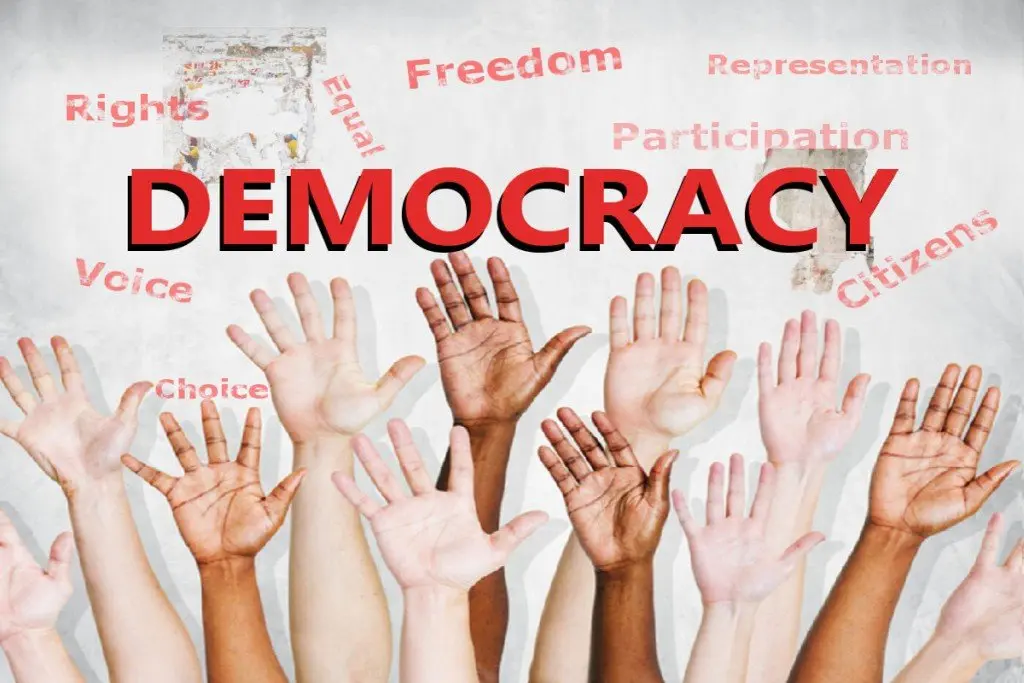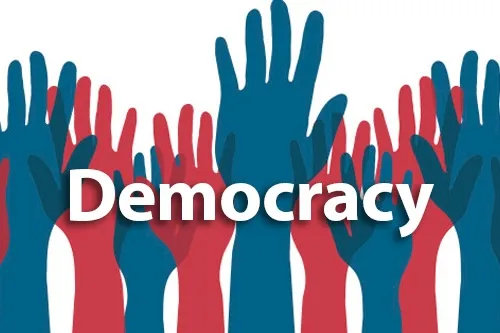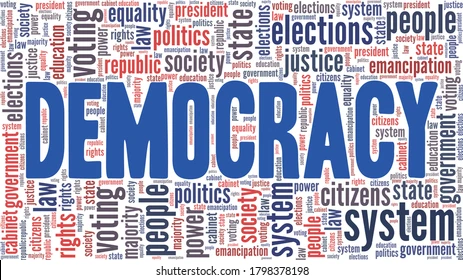Features of Democracy: A Comprehensive Overview
In today’s complex political landscape, democracy stands as a beacon of hope, providing a platform for citizens to participate in governance. This article will delve into the core features of democracy, examining what makes it a fundamental system of government that empowers individuals and fosters social and political development.
Introduction: Unveiling the Features of Democracy

Features of Democracy is a political framework that encourages active involvement of citizens in decision-making processes, offering them the freedom to elect their leaders and voice their opinions. This article will explore the features that distinguish democratic systems from other forms of government.
1. Popular Sovereignty
At the heart of democracy lies the principle of popular sovereignty. In a democratic society, the ultimate authority rests with the people, who elect their representatives. This fundamental feature ensures that the government derives its power from the consent of the governed.
1.1. Voting Rights
One of the essential aspects of popular sovereignty is universal suffrage, allowing all eligible citizens to vote. The right to vote is the cornerstone of democracy, giving everyone a voice in shaping their nation’s future.
2. Rule of Law
Features of Democracy operates under the rule of law, which means that no one, not even the government itself, is above the law. This ensures fairness and equality, as everyone is held accountable for their actions.
2.1. Protection of Civil Liberties
A Features of Democracy society upholds the protection of civil liberties, including freedom of speech, assembly, and religion. Citizens are free to express their opinions and beliefs without fear of persecution.
3. Multi-Party System
In democratic countries, political power is distributed among multiple parties, each representing various ideologies and interests. This diversity promotes healthy political debate and choice for citizens.
3.1. Political Pluralism
Political pluralism encourages a range of perspectives and solutions, preventing the concentration of power in a single entity. It fosters innovation in governance.
4. Transparency and Accountability
Features of Democracy thrives on transparency and accountability. Government institutions are required to provide information to the public, and elected officials are answerable for their actions.
4.1. Freedom of Information
Access to information allows citizens to make informed decisions and hold their representatives accountable. It ensures that power is not wielded in secrecy.
5. Checks and Balances
A democratic system includes mechanisms to prevent the abuse of power. These checks and balances involve the separation of powers among the legislative, executive, and judicial branches of government.
5.1. Independent Judiciary
An independent judiciary ensures that the legal system remains impartial and protects the rights of individuals, even in the face of government actions.
6. Regular Elections
In a democratic society, regular elections are held to choose leaders and representatives. These elections are a critical feature that allows for peaceful transitions of power.
6.1. Fair Electoral Processes
To maintain the integrity of elections, democratic countries implement fair electoral processes, free from fraud or manipulation.
7. Civilian Control of the Military
Features of Democracy prevents the military from having undue influence over government decisions. Civilian control of the military is a key feature that ensures the military serves the interests of the nation rather than dictating policies.
7.1. Protection Against Coup d’États
Civilian control of the military helps prevent military coups, preserving democratic governance.
The Global Significance of Democracy

Features of Democracy is not confined to a particular region; it has become a global phenomenon. Its principles of popular sovereignty, rule of law, transparency, and accountability have captured the imagination of nations worldwide. In an interconnected world, the features of democracy are not only a source of internal strength but also a means of fostering cooperation and peace among nations.
Promoting Peace and Diplomacy
Features of Democracy are more likely to engage in peaceful diplomacy and collaboration. Their transparent decision-making processes, respect for human rights, and checks and balances reduce the likelihood of conflict. As a result, democratic nations often work together to address global challenges, from climate change to international security.
Economic Prosperity
The Features of Democracy, such as protection of property rights and the rule of law, create a conducive environment for economic growth. When people are secure in their possessions and confident in the fairness of contracts, entrepreneurship flourishes, and innovation thrives. This, in turn, leads to economic prosperity.
Cultural and Social Diversity
Features of Democracy acknowledges the diversity of cultures and beliefs within a nation. Inclusive systems that protect the rights of minority groups foster social harmony and understanding. Citizens from different backgrounds can coexist and collaborate peacefully, enriching the cultural fabric of a nation.
Democratic Challenges
While Features of Democracy offers numerous benefits, it is not without its challenges. The very features that make democracy powerful can also make it vulnerable to manipulation and corruption. Here are a few common issues that democracies face:
1. Voter Apathy
In some democratic societies, voter turnout can be disappointingly low, indicating a lack of engagement and participation. Encouraging civic education and increasing awareness can address this concern.
2. Populism
Populism, while not exclusive to democracies, can exploit the democratic process to undermine institutions and promote divisive agendas. Vigilance and strong democratic institutions are essential for countering this threat.
3. Polarization
Features of Democracy can experience political polarization, where extreme divisions between opposing groups hinder cooperation. Promoting dialogue and compromise is crucial to overcome this challenge.
The Ongoing Evolution of Democracy
Features of Democracy is not a static concept; it evolves as societies change and adapt to new challenges. The core features of democracy remain essential, but their application may vary. As technology advances and societies become more interconnected, the ways in which democracy operates will continue to evolve.
Features of Democracy lies in its ability to address societal needs, uphold human rights, and provide a framework for peaceful governance. As long as its core features are preserved and nurtured, democracy will continue to be a beacon of hope and a model for nations around the world.
The Role of Civic Education
Civic education is a cornerstone of a robust democracy. To address challenges like voter apathy, polarization, and the rise of populism, it’s imperative to invest in educating citizens about their rights, responsibilities, and the inner workings of democratic systems. Civic education empowers individuals to become informed, engaged, and responsible participants in their democratic societies.
The Digital Age and Democracy
The digital age has brought new dimensions to democracy. Technology has enabled instantaneous communication, making it easier for citizens to access information, participate in political discourse, and hold their leaders accountable. However, it also introduces challenges, such as misinformation and cybersecurity threats.
1. Combating Misinformation
In a Features of Democracy society, the spread of misinformation can undermine the integrity of elections and public trust. Promoting media literacy and fact-checking initiatives is essential to combat this issue.
2. Ensuring Data Security
With the increasing reliance on digital systems for elections and governance, cybersecurity becomes a critical concern. Protecting data and securing critical infrastructure is paramount in preserving the democratic process.
The Global Spread of Democracy
Democracy has seen significant growth around the world, with many nations adopting democratic systems. While each country adapts democracy to its unique cultural and political context, the core features remain consistent. This global expansion of democracy reflects its enduring appeal and effectiveness.
The Responsibility of Citizens
Features of Democracy, the power ultimately lies with the people. To ensure that democracy remains strong and vibrant, citizens must actively participate, exercise their voting rights, and engage in civic activities. Apathy and inaction can erode the very foundations of democracy.
Strengthening Democracy for Future Generations
As we reflect on the enduring legacy of democracy, it is crucial to look to the future and consider how we can ensure its continued strength and vitality for the generations to come.
Youth Engagement
Engaging young people in the democratic process is key to ensuring the long-term success of democracy. Youth represent the future, and their active involvement in voting, civic activities, and political discourse is vital. Educational institutions and community programs should encourage youth to become informed and active citizens.
Civic Empowerment
Empowering citizens to play a more significant role in shaping their communities and nations is a central component of democracy. Grassroots movements, community initiatives, and platforms for citizen participation can further enhance democratic engagement.
International Cooperation
In a globalized world, international cooperation is essential. Democracies worldwide should collaborate to address transnational challenges, from climate change to economic stability. This cooperation not only promotes peace but also demonstrates the collective strength of democratic values.
Adapting to New Challenges
As the world evolves, new challenges arise that democracies must confront. Issues like climate change, cybersecurity, and global health crises require innovative and collaborative approaches. Democracies must adapt their institutions and processes to effectively address these challenges.
Democracy as a Work in Progress
Features of Democracy is not a utopian system. It has flaws and can face setbacks. Yet, it remains the best system we have for promoting individual freedoms, human rights, and self-governance. Its strength lies in its ability to adapt, evolve, and overcome challenges.
Features of Democracy is not a destination but a journey, and each generation must continue the work of building a more just, inclusive, and transparent society. The core features of democracy provide the framework for this journey, and it is up to citizens, governments, and international alliances to make the most of this enduring and empowering system.
The Fragility of Democracy
Features of Democracy is a resilient system, it is not immune to challenges and threats. Understanding these vulnerabilities is crucial to protecting and strengthening democratic values. Some key threats include:
Erosion of Democratic Norms
In some democracies, there has been a worrying trend of eroding democratic norms, with leaders and institutions challenging the principles of rule of law, freedom of the press, and separation of powers. Vigilance in upholding these norms is essential.
Political Polarization
Political polarization can undermine the ability of a democracy to function effectively. Extremism and the refusal to compromise can hinder the government’s ability to address pressing issues.
Disinformation and Misinformation
The digital age has ushered in an era of disinformation and misinformation, which can manipulate public opinion, influence elections, and undermine trust in democratic processes. Efforts to combat this issue are critical.
Populist Leaders
Populist leaders who undermine democratic institutions and promote authoritarianism pose a significant threat to democracy. Vigilance in protecting democratic institutions is essential.
External Interference
Features of Democracy can be vulnerable to external interference in their elections and political processes. Safeguarding electoral integrity and national sovereignty is paramount.
Defending Democracy
In the face of these challenges, citizens, governments, and international organizations have a role to play in defending democracy. Key strategies include:
Promoting Civic Education
Civic education is a powerful tool to equip citizens with the knowledge and skills to engage in the democratic process responsibly and critically.
Strengthening Institutions
The rule of law, an independent judiciary, and free media are vital to a robust democracy. Efforts to strengthen these institutions must be a priority.
Fostering Inclusivity
Inclusive democratic processes that respect the rights of all citizens, including minority groups, are essential for social cohesion.
International Cooperation
Features of Democracy should work together to address common challenges, whether they are related to security, the environment, or public health.
Advocating for Democratic Values
Promoting the values of democracy, including human rights, freedom, and accountability, on a global scale can encourage positive change.
Democracy’s Future
The future of democracy is in our hands. While it faces challenges, it remains a beacon of hope, offering a path toward a more just, inclusive, and peaceful world. It is a system that empowers individuals and communities, fostering a spirit of cooperation, understanding, and respect.
In this ever-evolving world, democracy’s enduring legacy lies in its ability to adapt and address new challenges. It will continue to be a source of inspiration for nations worldwide, a model for governance, and a testament to the power of the people.
The Imperative of Continuous Progress

As we look to the future of democracy, it’s essential to recognize that progress is not guaranteed. Democracy is a living, breathing system that requires active stewardship. Here are some key actions that can help shape the future of democracy:
1. Digital Literacy and Civic Engagement
In an increasingly digital world, promoting digital literacy and responsible online engagement is vital. Citizens must learn to discern reliable information from misinformation, engage in constructive online dialogues, and make informed decisions about their leaders and policies.
2. Grassroots Movements
Grassroots movements have the potential to effect profound change within democratic societies. Citizens who are passionate about various causes can mobilize and drive political change by pressuring governments and institutions to address pressing issues.
3. Political Accountability
Elected officials and leaders must be held accountable for their actions. Transparency, reporting mechanisms, and a vigilant media play pivotal roles in ensuring that those in power are answerable to the public.
4. Global Cooperation
Global challenges, such as climate change and pandemics, require international cooperation. Democracies can lead the way in fostering collaboration on these critical issues, demonstrating the adaptability and strength of democratic values on a global scale.
5. Protecting Vulnerable Populations
Features of Democracy promise of equality and human rights must extend to all, including vulnerable populations such as refugees, minorities, and marginalized communities. Ensuring their protection is integral to upholding democratic values.
The Dynamic Legacy of Democracy
Democracy is not a static institution but an evolving concept that continuously adapts to the needs and aspirations of the people it serves. Its strength lies in its capacity for change, growth, and resilience.
In this age of uncertainty, democracy remains a beacon of hope, offering a path towards a more equitable, just, and inclusive world. As we continue to grapple with emerging challenges and seize new opportunities, democracy’s enduring legacy will continue to shine brightly, guiding nations towards a future characterized by freedom, accountability, and the empowerment of individuals.
Frequently Asked Questions
1. What is the primary role of popular sovereignty in a democracy?
Popular sovereignty ensures that the ultimate authority rests with the people, who elect their representatives and shape the nation’s future through their votes.
2. How does a multi-party system contribute to democracy?
A multi-party system fosters political diversity, promoting healthy debate and offering citizens a range of choices in their leadership.
3. Why is an independent judiciary essential in a democratic society?
An independent judiciary upholds the rule of law, ensuring that legal decisions are impartial and protecting individual rights.
4. What is the significance of civilian control of the military in democracy?
Civilian control of the military prevents the military from exerting undue influence over government decisions and helps protect democratic governance.
5. How do regular elections promote democracy?
Regular elections allow for peaceful transitions of power and provide citizens with the opportunity to choose their leaders and representatives.
6. How does democracy promote international cooperation?
Democracies tend to engage in peaceful diplomacy, collaborate to address global challenges, and promote international cooperation, enhancing global stability.
7. What economic benefits are associated with democracy?
Democracy fosters economic prosperity by protecting property rights, ensuring the rule of law, and encouraging entrepreneurship and innovation.
8. How does democracy deal with cultural and social diversity?
Democracy respects cultural and social diversity by protecting the rights of minority groups and promoting social harmony and understanding.
9. What challenges do democracies face?
Democracies can face challenges like voter apathy, populism, and political polarization. These challenges can be addressed through civic education, vigilance, and dialogue.
10. How is democracy evolving in the modern world?
Democracy continues to evolve as societies change and adapt to new challenges. The core features of democracy remain essential, but their application may vary with technological advancements and increased interconnectedness.
